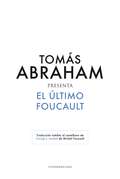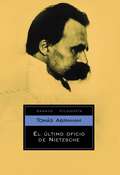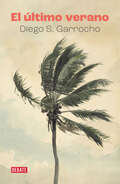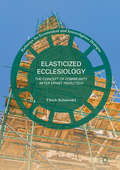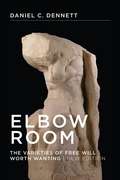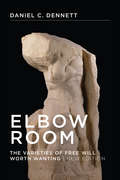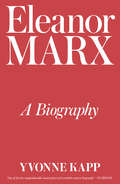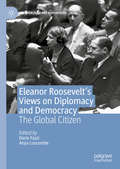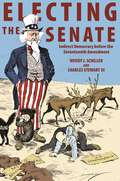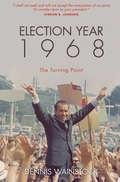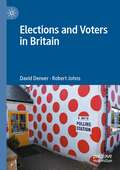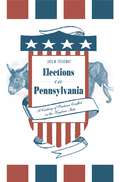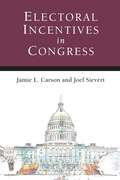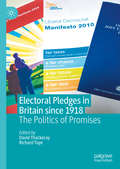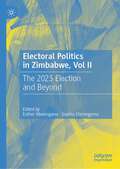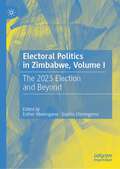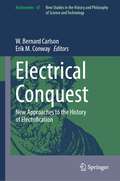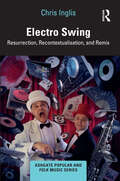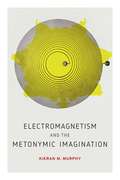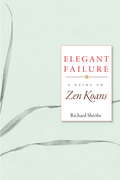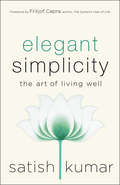- Table View
- List View
El último Foucault: Traducción inédita al castellano de Coraje y verdad de Michel Foucault
by Tomás AbrahamPor primera vez se edita en castellano el último seminario de Foucault. Corresponde a sus reflexiones sobre las relaciones entre la filosofía y el arte de vivir pensando por los griegos. Foucault muere en junio de 1984. Durante el año 1983 dicta su último curso en París en el College de France y en Berkeley, Estados Unidos. La temática interviene en nuestra actualidad al resignificar nuestra visión sobre el cinismo, y al ofrecer elementos críticos para situar las espiritualidades terapéuticas de nuestros días. El libro contiene cinco ensayos escritos en el marco del Seminario de los Jueves coordinado por Tomás Abraham. Felisa Santos escribe acerca de la mirada foucaultiana sobre estos textos antiguos; Mónica Cabrera reconstruye el último Sócrates de Focault; Marcelo Pompei interroga las reflexiones de Foucault sobre Maquiavelo; Cristian Ferrer aporta una descripción novedosa sobre la estética de la existencia y el cuidado de sí entre los anarquistas de principio de siglo. Finalmente, Tomas Abraham nos presenta a Paúl Veyne, un amigo especial de Focault. Estos ensayos, junto al curso complemento de Foucault, ofrecen una nueva visión sobre su obra en la que el rigor de la presentación es paralelo a la claridad de la exposición.
El último oficio de Nietzsche
by Tomás AbrahamUn oficio es un modo de pensar la vida, y Nietzsche fue un filósofo con varios oficios. Este libro circular y bicéfalo expone el fracaso del primer oficio de Nietzsche y el desencadenamiento de los que siguieron, hasta llegar al último secreto, y volver así al testimonio del primero. En la primera parte, el ensayo de Tomas Abraham traza el diagrama de los oficios en relación con los amores de Nietzsche, que fueron pocos pero cruciales. La presencia diabólica de Wagner -su pater seraficus-, la de Lou Andreas-Salome, que lo rechazó y comprendió con inteligencia piadosa y distante, la de Paúl Ree, que lo liberó de su pasión pastoral. Todos estos amores atravesaron su obra. El autor dedica especial atención al amor más importante de todos, porque fue depredatorio e histórico: el de su hermana. En la segunda parte de editan en su totalidad los artículos de combate en torno a «El nacimiento de la tragedia», el libro que dividió las aguas de los oficios. Esta edición -completa, con un riguroso trabajo filosófico y un estudio preliminar de Germán Sucar- es un trofeo añorado desde hace años por los seguidores de Nietzsche y los amantes de la filosofía. Nietzsche es un filósofo que piensa contra sí mismo llevado por la fuerza de una lucidez cruel e inestable. Su pensamiento es una radiación que se expande con la fuerza de la adversidad. Por eso Nietzsche es actual, porque exhibe la pasión del pensar en su irrefrenable camino de crear nuevos espacios y en su repulsa a dejarse domesticar por interpretaciones «in vitro». La filosofía de Nietzsche no es un sistema, es el canto de un filósofo solidario que sigue siendo nuestra gran compañía. Por eso este libro: para volver a escuchar esa voz.
El último verano
by Diego S. GarrochoLa filosofía como elemento esencial de la vida cotidiana y para la comprensión del mundo. Diego Garrocho introduce en sus textos, con deslumbrante agilidad y hondura, una mirada filosófica que resulta muy poco frecuente en el panorama del periodismo en España. El último verano es una selección cuidada y equilibrada de sus mejores columnas y ensayos cortos, que elude lo coyuntural y aborda la vida y la tensión entre el pasado y el futuro, con un enfoque intelectual pero no exento denostalgia e intimidad. El libro condensa las convicciones del autor, defiende la cultura como único instrumento para reparar el mundo, reflexiona sobre el talento e invoca a figuras como Tennessee Williams, Ferlosio, Leopardi, Aristóteles o Platón. A lo largo de la historia, numerosos filósofos y pensadores han encontrado en el ensayo breve y los artículos un modo idóneo de transmitir sus ideas de manera que, sin perder el rigor conceptual o la fuerza de sus tesis, estas pudieran llegar a un público amplio. Este libro se enmarca en esa tradición, y demuestra que la Filosofía también tiene la capacidad de abordar los problemas de una manera directa y eficaz. El último verano, que puede leerse en clave generacional, ofrece una perspectiva sensible y original sobre el mundo, y es una maravillosa muestra del trabajo en prensa que, desde hace algunos años, Diego Garrocho combina con su labor académica.
Elastic Language
by Grace Q. ZhangElastic language carries non-specific and stretchable meaning, as in 'He loves her, kind of'. It is used like a slingshot, targeting various strategic goals. Consolidating current research and charting new directions, this book develops a refreshing theory of elasticity, empirically attested by natural language data from tension-prone encounters between Australian Customs officers and passengers. The theory proposes three principles (fluidity, stretchability and strategy) and offers a systematic look at how elastic language, as a sliding scale, works to balance strengthening and weakening speech tones, to firm and soften a speaker's stance, and to reveal and evade the truth. The comparative analysis of forms, functions, and context confirms that elastic language is fluid, stretchable, and strategic. It serves both cooperative and competitive functions, and social and speech factors impact on its use. This book will appeal to students and researchers working in pragmatics, applied linguistics, sociolinguistics, discourse analysis, and communication.
Elasticized Ecclesiology
by Ulrich SchmiedelThis study confronts the current crisis of churches. In critical and creative conversation with the German theologian Ernst Troeltsch (1865-1923), Ulrich Schmiedel argues that churches need to be "elasticized" in order to engage the "other. " Examining contested concepts of religiosity, community, and identity, Schmiedel explores how the closure of church against the sociological "other" corresponds to the closure of church against the theological "other. " Taking trust as a central category, he advocates for a turn in the interpretation of Christianity--from "propositional possession" to "performative project," so that the identity of Christianity is "done" rather than "described. " Through explorations of classical and contemporary scholarship in philosophy, sociology, and theology, Schmiedel retrieves Troeltsch's interdisciplinary thinking for use in relation to the controversies that encircle the construction of community today. The study opens up innovative and instructive approaches to the investigation of the practices of Christianity, past and present. Eventually, church emerges as a "work in movement," continually constituted through encounters with the sociological and the theological "other. "
Elbow Room
by Daniel C. DennettIn this landmark 1984 work on free will, Daniel Dennett makes a case for compatibilism. His aim, as he writes in the preface to this new edition, was a cleanup job, "saving everything that mattered about the everyday concept of free will, while jettisoning the impediments. " In Elbow Room, Dennett argues that the varieties of free will worth wanting -- those that underwrite moral and artistic responsibility -- are not threatened by advances in science but distinguished, explained, and justified in detail. Dennett tackles the question of free will in a highly original and witty manner, drawing on the theories and concepts of fields that range from physics and evolutionary biology to engineering, automata theory, and artificial intelligence. He shows how the classical formulations of the problem in philosophy depend on misuses of imagination, and he disentangles the philosophical problems of real interest from the "family of anxieties" in which they are often enmeshed -- imaginary agents and bogeymen, including the Peremptory Puppeteer, the Nefarious Neurosurgeon, and the Cosmic Child Whose Dolls We Are. Putting sociobiology in its rightful place, he concludes that we can have free will and science too. He explores reason, control and self-control, the meaning of "can" and "could have done otherwise," responsibility and punishment, and why we would want free will in the first place. A fresh reading of Dennett's book shows how much it can still contribute to current discussions of free will. This edition includes as its afterword Dennett's 2012 Erasmus Prize essay.
Elbow Room, new edition: The Varieties of Free Will Worth Wanting
by Daniel C. DennettA landmark book in the debate over free will that makes the case for compatibilism.In this landmark 1984 work on free will, Daniel Dennett makes a case for compatibilism. His aim, as he writes in the preface to this new edition, was a cleanup job, “saving everything that mattered about the everyday concept of free will, while jettisoning the impediments.” In Elbow Room, Dennett argues that the varieties of free will worth wanting—those that underwrite moral and artistic responsibility—are not threatened by advances in science but distinguished, explained, and justified in detail.Dennett tackles the question of free will in a highly original and witty manner, drawing on the theories and concepts of fields that range from physics and evolutionary biology to engineering, automata theory, and artificial intelligence. He shows how the classical formulations of the problem in philosophy depend on misuses of imagination, and he disentangles the philosophical problems of real interest from the “family of anxieties” in which they are often enmeshed—imaginary agents and bogeymen, including the Peremptory Puppeteer, the Nefarious Neurosurgeon, and the Cosmic Child Whose Dolls We Are. Putting sociobiology in its rightful place, he concludes that we can have free will and science too. He explores reason, control and self-control, the meaning of “can” and “could have done otherwise,” responsibility and punishment, and why we would want free will in the first place. A fresh reading of Dennett's book shows how much it can still contribute to current discussions of free will. This edition includes as its afterword Dennett's 2012 Erasmus Prize essay.
Eleanor Marx: A Biography
by Yvonne KappNew edition of Yvonne Kapp's much-celebrated biographyEleanor Marx is one of the most tragically overlooked feminists intellectuals in history. To the extent that she is known, interest in her is often limited to her proximity to Karl Marx, her father. But not only did she edit, translate, transcribe and collaborate with him, she also spent her extraordinary life putting his ideas into practice as a labour organizer and radical. This highly acclaimed biography brilliantly succeeds in capturing Eleanor's spirit, from a lively child, opining on the world's affairs, to the new woman, aspiring to the stage, earning her living as a free intellectual, and helping to lead England's unskilled workers at the height of the new unionism; being always more than, yet at the same time inescapably, Karl Marx's daughter. It is also, inevitably, an unrivalled biography of the Marx household in Victorian London, of the Marx circle, and of Friedrich Engels, the family's extraordinary mentor.Eleanor's biography appeared first at the height of feminist organizing, and does so again in this single-volume edition as the interest in feminism resurges, as a crucial corrective to a narrative that puts feminists and marxists on opposing sides of radical history.
Eleanor Roosevelt's Views on Diplomacy and Democracy: The Global Citizen (The World of the Roosevelts)
by Dario Fazzi Anya Luscombe"This volume fills a void in current studies of Eleanor Roosevelt. Offering a comprehensive analysis of Roosevelt as a diplomat during the Cold War era, it is particularly insightful in analyzing her position on United States race relations while at the United Nations. It provides a new look at Roosevelt’s leadership from an American perspective played out on a global stage."- Maurine H. Beasley, Professor Emerita, University of Maryland College Park, USA"My grandmother was an ardent "small-d" democrat, as well as a Democrat - but she didn't think we were very mature in our living of it! This well-written and illuminating collection of essays, focused on what ER thought it meant to be a global citizen, offers a unique perspective of her views on a host of issues. Let us hope these fresh insights can inspire young people today to construct that better world to which she dedicated much of her life."- Anna Eleanor RooseveltThis book focuses on Eleanor Roosevelt’s multifaceted agenda for the world. It highlights her advocacy of human rights, multilateral diplomacy, and transnationalism, and it emphasizes her challenge to gendered norms and racial relations. The essays of this collection describe Eleanor Roosevelt as a public intellectual, a politician, a public diplomat, and an activist. She was, undeniably, one of the protagonists of the twentieth century and a proactive interpreter of the many changes it brought about. She went through two world wars, the harshness of the Great Depression, and the emergence of nuclear confrontation, and she deciphered such crises as the product of misleading nationalism and egoism. Against them, she offered her commitment to people’s education as an example of civic engagement, which she considered necessary for the functioning of any democratic order. Such was the world Eleanor Roosevelt envisioned and tried to build – symbolically and practically – one where people, the citizens of the world, may really be at the center of international affairs.
Electing the Senate: Indirect Democracy before the Seventeenth Amendment (Princeton Studies in American Politics: Historical, International, and Comparative Perspectives #146)
by Wendy J. Schiller Charles StewartHow U.S. senators were chosen prior to the Seventeenth Amendment—and the consequences of Constitutional reformFrom 1789 to 1913, U.S. senators were not directly elected by the people—instead the Constitution mandated that they be chosen by state legislators. This radically changed in 1913, when the Seventeenth Amendment to the Constitution was ratified, giving the public a direct vote. Electing the Senate investigates the electoral connections among constituents, state legislators, political parties, and U.S. senators during the age of indirect elections. Wendy Schiller and Charles Stewart find that even though parties controlled the partisan affiliation of the winning candidate for Senate, they had much less control over the universe of candidates who competed for votes in Senate elections and the parties did not always succeed in resolving internal conflict among their rank and file. Party politics, money, and personal ambition dominated the election process, in a system originally designed to insulate the Senate from public pressure.Electing the Senate uses an original data set of all the roll call votes cast by state legislators for U.S. senators from 1871 to 1913 and all state legislators who served during this time. Newspaper and biographical accounts uncover vivid stories of the political maneuvering, corruption, and partisanship—played out by elite political actors, from elected officials, to party machine bosses, to wealthy business owners—that dominated the indirect Senate elections process. Electing the Senate raises important questions about the effectiveness of Constitutional reforms, such as the Seventeenth Amendment, that promised to produce a more responsive and accountable government.
Election Year 1968
by Dennis D. WainstockThe 1968 election saw the return of the Republican party to the White House and major changes in the political landscape. It was one of the most contentious and unpredictable contests in American history. From Lyndon Baines Johnson's exit following Eugene McCarthy's win in New Hampshire to the Robert Francis Kennedy murder, the Martin Luther King, Jr. assassination, and the Chicago Democratic Convention, it relives in this recounting of that explosive year. Vietnam was the main issue but also civil rights and George Wallace, who captured an astounding thirteen percent of the vote. The author interviewed some thirty-five politicians and players, most of them previously unpublished. Dennis D. Wainstock, PhD, is the author of Malcolm X: The Life and Times of an African-American Revolutionary, The Decision to Drop the Atomic Bomb, and Truman, MacArthur and the Korean War. He teaches history at Fairmont State University and lives in Salem, West Virginia.
Elections and Voters in Britain
by Robert Johns David DenverHow do voters in Britain decide which party to vote for in elections? Have age and education replaced class as the social basis for voting? Are elections now ‘presidentialised’, with voters simply choosing between party leaders? What role do the media, new and old, play in all of this? The authors examine these and other questions in the fourth edition of this popular text. The core of the text is devoted to examining and explaining theories of party choice, including the debate about whether voters are driven more by issues and ideology or simply by which party and leader looks least likely to make a mess of things in office. The authors also devote separate chapters to turnout trends and patterns, the media, electoral systems, the geography of party support, and – new to this edition – referendums. Fully revised and with detailed analysis of the 2019 election and the electoral fallout of Brexit, the text incorporates the latest research on elections and voting behaviour, and includes analysis of recent trends and developments – such as the effect of digital media on electoral politics and where recent misfires leave the opinion polls.
Elections in Oxford County, 1837-1875
by George EmeryElections in Oxford County, 1837-75 is a unique exploration of the forms, practices, and issues of democracy in a mid-nineteenth-century colonial setting. In this case study of thirty-eight elections in Oxford County -- first as part of the United Province of Canada, then in early Ontario -- George Emery delves into the advances, setbacks, and flaws of a partially democratic system. Emery demonstrates that while its forms and issues evolved, the net amount of democracy remained stable over time.Elections in Oxford County, 1837-75 breaks new ground with its detailed treatment of the county's voice-vote method of election, which ended with the adoption of the secret ballot in 1874. Employing an idealized parliamentary democracy as an explanatory model, Emery captures both geographically specific details and general features of this era's electoral process to enrich current understandings of nineteenth-century Canadian democracy.
Elections in Pennsylvania: A Century of Partisan Conflict in the Keystone State
by Jack M. TreadwayThe most comprehensive state election study ever undertaken, Elections in Pennsylvania provides data and analysis for more than 13,000 general elections and more than 6,000 primary elections held in the state between 1900 and 1998, with a postscript examining in less detail the elections of 2000 and 2002. Included are all elections for president, governor, U.S. senators and representatives, statewide offices, and members of the General Assembly. The extensive period of time covered allows the author to provide an important historical perspective on electoral trends, distinguishing what are genuinely new developments in electoral dynamics and voting behavior in recent decades from what are continuations of patterns earlier in the century.
Electoral Incentives in Congress (Legislative Politics And Policy Making)
by Jamie L Carson Joel SievertDavid Mayhew’s 1974 thesis on the “electoral connection” and its impact on legislative behavior is the theoretical foundation for research on the modern U.S. Congress. Mayhew contends that once in office, legislators pursue the actions that put them in the best position for reelection. The electoral connection is a post-World War II phenomenon, but legislative scholars now suggest that Mayhew’s argument applies to earlier congressional eras. To assess these claims, Carson and Sievert investigate whether earlier legislators were motivated by the same factors that influence their behavior today, especially in pursuit of reelection. They examine how electoral incentives shape legislative behavior throughout the nineteenth century by looking at patterns of turnover in Congress; the re-nomination of candidates; the roles of parties in recruiting candidates, and by extension their broader effects on candidate competition; and, finally by examining legislators’ accountability. The results have wide-ranging implications for the evolution of Congress and the development of various legislative institutions over time.
Electoral Pledges in Britain Since 1918: The Politics of Promises
by Richard Toye David ThackerayNobody doubts that politicians ought to fulfil their promises – what people cannot agree about is what this means in practice. The purpose of this book is to explore this issue through a series of case studies. It shows how the British model of politics has changed since the early twentieth century when electioneering was based on the articulation of principles which, it was expected, might well be adapted once the party or politician that promoted them took office. Thereafter manifestos became increasingly central to electoral politics and to the practice of governing, and this has been especially the case since 1945. Parties were now expected to outline in detail what they would do in office and explain how the policies would be paid for. Brexit has complicated this process, with the ‘will of the people’ as supposedly expressed in the 2016 referendum result clashing with the conventional role of the election manifesto as offering a mandate for action.
Electoral Politics in Zimbabwe, Vol II: The 2023 Election and Beyond
by Sophia Chirongoma Esther MavenganoVolume two of Electoral Politics in Zimbabwe: The 2023 Election and Beyond argues that research into Zimbabwe’s politics is multifaceted and topical, particularly because for more than two decades now, this Southern African state has been dogged by multiple problems including hyperinflation, drought, escalating poverty levels, extremely high unemployment rates and political instabilities. The volume’s overall goal is to ignite intellectual discussions and practical action towards turning the political wheels that have been in place for decades. The first segment examines the interface between gender and electoral politics in Zimbabwe. The second part discusses the role of the media in Zimbabwe’s electoral politics. The third section reflects on the role of traditional leaders and religious discourses in Zimbabwe’s electoral politics. The book will be a key resource to colleges, universities and organisations in Zimbabwe, the Southern Africa region and even beyond.
Electoral Politics in Zimbabwe, Volume I: The 2023 Election and Beyond
by Sophia Chirongoma Esther MavenganoVolume one of Electoral Politics in Zimbabwe pays special attention to the overarching view that the 2023 harmonized elections define the fate of the major presidential contenders and their parties as well as (re) shaping the political and economic trajectories of the nation. Cognizant of the complex nature of the Zimbabwean political realm and nuanced dynamics at play, the chapters in this volume cover three interrelated themes: the electoral environment in Zimbabwean politics; language, politics, and elections in Zimbabwe; and lastly, electoral institutions and human rights in Zimbabwean politics. The chapters foreground the ongoing tensions and politicking between the two main rivals, the ruling party, ZANU PF and the main opposition party, the Citizens Coalition for Change (CCC). The contributors also highlight the impact of internal tensions and factionalism within the contending parties, the apparent voter apathy, disconcerting voices due to claims about lack of transparency and a toxic political space as factors impacting on the outcome of the 2023 presidential elections. The volume will appeal to academics and practitioners in politics, human rights, religion, gender, media, languages, linguistics, and development studies.
Electoral Reform and National Security in Japan
by Amy CatalinacJapan is the third-largest economy in the world and a key ally of the United States. Yet the determinants of Japanese security policy are not well understood. The question of why Japan never sought the independent military capabilities that would be commensurate with its economic power has puzzled scholars of international relations for decades. Applying new tools for the quantitative analysis of text to a new collection of 7,497 Japanese-language election manifestos used in elections between 1986 and 2009, this book argues that the electoral strategies politicians in the ruling party were forced to adopt under Japan's old electoral system made it extraordinarily difficult for them to focus on security issues and to change security policy. It was only when their electoral strategies shifted after electoral reform in 1994 that these same politicians became able to pay attention and change security policy.
Electrical Conquest: New Approaches to the History of Electrification (Archimedes #67)
by W. Bernard Carlson Erik M. ConwayThis book, drawing on fresh scholarship, investigates electrification in new places and across different time periods. While much of our understanding of electrification as a historical process is based on the seminal work done by Thomas P. Hughes in Networks of Power (1983), the scholars in this volume expand and revise Hughes’ systems approach to suggest that electrification is a heterogeneous and contingent process. Moreover, the contributors suggest that the conquest of the world by electricity remains incomplete despite more than a century elapsing. Above all, though, this book provides context for thinking about what lies ahead as humans continue their conquest of the earth through electricity. As we become increasingly dependent on electricity to power our lights, heat and cool our homes, turn the wheels of industry, and keep our information systems humming, so we are ever more vulnerable when the grid runs into trouble.Chapter "Surveying the Landscape: The Oil Industry and Alternative Energy in the 1970s" is available open access under a Creative Commons Attribution 4.0 International License via link.springer.com.
Electro Swing: Resurrection, Recontextualisation, and Remix (Ashgate Popular and Folk Music Series)
by Chris InglisElectro swing is a relatively recent musical style and scene which combines the music of the swing era with that of the age of electronic dance music. Chris Inglis considers key questions about electro swing’s place in contemporary society, including what it may mean for a contemporary genre to be so reliant upon the influences of the past; the different ways in which jazz may be presented to a modern audience; how one may go about defining jazz in todays postmodern world; and how this emergent genre may be analysed in terms of the wider issues of race and class consumption.
Electromagnetism and the Metonymic Imagination (AnthropoScene #4)
by Kieran M. MurphyHow does the imagination work? How can it lead to both reverie and scientific insight? In this book, Kieran M. Murphy sheds new light on these perennial questions by showing how they have been closely tied to the history of electromagnetism.The discovery in 1820 of a mysterious relationship between electricity and magnetism led not only to technological inventions—such as the dynamo and telegraph, which ushered in the “electric age”—but also to a profound reconceptualization of nature and the role the imagination plays in it. From the literary experiments of Edgar Allan Poe, Honoré de Balzac, Villiers de l’Isle-Adam, and André Breton to the creative leaps of Michael Faraday and Albert Einstein, Murphy illuminates how electromagnetism legitimized imaginative modes of reasoning based on a more acute sense of interconnection and a renewed interest in how metonymic relations could reveal the order of things.Murphy organizes his study around real and imagined electromagnetic devices, ranging from Faraday’s world-changing induction experiment to new types of chains and automata, in order to demonstrate how they provided a material foundation for rethinking the nature of difference and relation in physical and metaphysical explorations of the world, human relationships, language, and binaries such as life and death. This overlooked exchange between science and literature brings a fresh perspective to the critical debates that shaped the nineteenth century.Extensively researched and convincingly argued, this pathbreaking book addresses a significant lacuna in modern literary criticism and deepens our understanding of both the history of literature and the history of scientific thinking.
Electromagnetism and the Metonymic Imagination (AnthropoScene: The SLSA Book Series #4)
by Kieran M. MurphyHow does the imagination work? How can it lead to both reverie and scientific insight? In this book, Kieran M. Murphy sheds new light on these perennial questions by showing how they have been closely tied to the history of electromagnetism.The discovery in 1820 of a mysterious relationship between electricity and magnetism led not only to technological inventions—such as the dynamo and telegraph, which ushered in the "electric age"—but also to a profound reconceptualization of nature and the role the imagination plays in it. From the literary experiments of Edgar Allan Poe, Honoré de Balzac, Villiers de l’Isle-Adam, and André Breton to the creative leaps of Michael Faraday and Albert Einstein, Murphy illuminates how electromagnetism legitimized imaginative modes of reasoning based on a more acute sense of interconnection and a renewed interest in how metonymic relations could reveal the order of things.Murphy organizes his study around real and imagined electromagnetic devices, ranging from Faraday’s world-changing induction experiment to new types of chains and automata, in order to demonstrate how they provided a material foundation for rethinking the nature of difference and relation in physical and metaphysical explorations of the world, human relationships, language, and binaries such as life and death. This overlooked exchange between science and literature brings a fresh perspective to the critical debates that shaped the nineteenth century.Extensively researched and convincingly argued, this pathbreaking book addresses a significant lacuna in modern literary criticism and deepens our understanding of both the history of literature and the history of scientific thinking.
Elegant Failure
by Richard ShrobeZen koans are stories of exchanges between Zen masters and their disciples at the moment of enlightenment or near-enlightenment. These stories have long fascinated Western readers because of their wisdom, humor, and enigmatic quality. Drawing on over 30 years of practice and teaching, Richard Shrobe (himself a recognized Zen Master) has selected 22 cases from The Blue Cliff Record and Wu-men-kuan that he finds deeply meaningful and helpful for meditation practice. In Elegant Failure, he provides a wealth of background information and personal anecdotes for each koan that help to illuminate its meaning without detracting from its paradoxical nature. As Shrobe reminds us, "The main core of Zen teaching is the bare bones of what is there. In a certain sense, embellishing a story takes away from the central teaching: Don't embellish anything, just be with it as it is."
Elegant Simplicity: The Art of Living Well
by Satish Kumar&“A profound and accessible guide to an ecological civilization of peace, material sufficiency, and spiritual abundance for all.&” —David Korten, international-bestselling author of When Corporations Rule the World Consumerism drives the pursuit of happiness in much of the world, yet as wealth grows unhappiness abounds, compounded by the grave problems of climate change, pollution, and ecological degradation. We&’ve now reached both an environmental and spiritual dead-end that leaves us crying out for alternatives. Elegant Simplicity provides a coherent philosophy of life that weaves together simplicity of material life, thought, and spirit. In it, Satish Kumar, environmental thought leader and former monk, distills five decades of reflection and wisdom into a guide for everyone, covering: · The ecological and spiritual principles of living simply · Shedding both &“stuff&” and psychological baggage · Opening your mind and heart to the deep value of relationships · Embedding simplicity in all aspects of life including education and work · Merging science and spirituality for a coherent worldview. Elegant Simplicity is a life guide for everyone wanting off the relentless treadmill of competition and consumption and seeking a life that prioritizes the ecological integrity of the Earth, social equity, and personal tranquility and happiness. &“Satish Kumar embodies the elegance of simplicity . . . follow his path to make your life simple, elegant, and inspiring.&” —Deepak Chopra, New York Times–bestselling author &“In this moving and eloquent book, Satish Kumar takes us through his own journey to a simpler, happier life with a low ecological footprint.&” —David Suzuki, award-winning geneticist, author, broadcaster, and environmental activist
